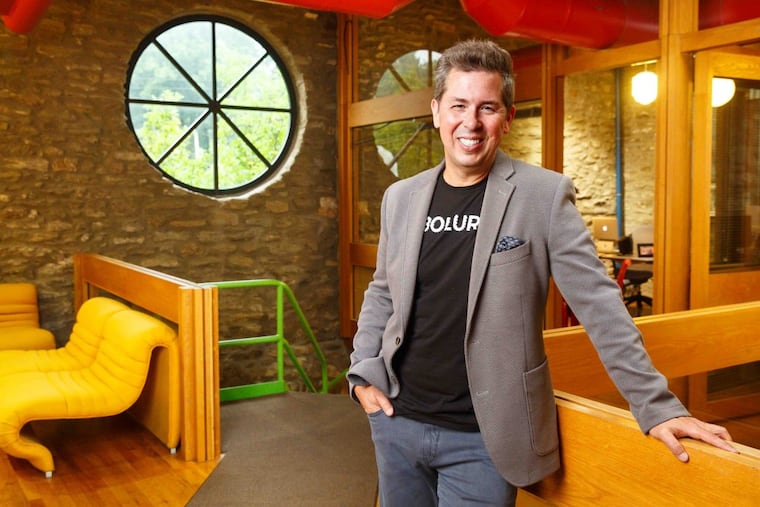Wyncote-based Globo translates globally for patients, gamers, and museum goers
Globo, a Wyncote-based B2B communication-platform provider specializing in translation and interpretation services, is on a robust growth track.

Gene Schriver knew he wasn't long for practicing law when, while on the phone with clients, he would find himself "more excited about what they were doing."
So the former litigator with Margolis Edelstein in Center City went in search of his own excitement. That included a stint with a dot-com on the West Coast and some screenwriting before returning to his native Montgomery County in 2001 to work with his mother in her small business for nine years.
What turned out to be career fulfillment, however, took a leap that was "equal parts excitement and full panic." In 2010, Schriver, 47 and a father of three, launched Globo LLC, a business-to-business translation-technology provider, from a bedroom in his Meadowbrook home.
Now moving into new headquarters in Wyncote, Globo had $10 million in annual revenue in 2016 — up from $2 million just three years ago, when it first became profitable. Its Globo HQ platform — built to help people who don't speak the same language communicate with one another — seemed an obvious fit for the health-care industry, Schriver said. Last month, a Globo interpreter helped a woman who spoke only the Central African language of Sango communicate with a U.S. doctor who spoke only English.
Less apparent at the company's start, but proving to be an especially promising niche, is mobile gaming. And in Philadelphia, the new Museum of the American Revolution has turned to Globo for help in reaching more international visitors.
Language translation "is a largely untapped market globally," Schriver said.
Despite a name suggesting worldwide ambition, Globo, with about 50 employees, has had no international sales effort, something that will change in 2018, said Schriver, the firm's chief executive. About 95 percent of the company's customer base is in the United States, where, according to U.S. Census figures, an estimated 62 million people (not counting undocumented residents) did not speak English as a first language the year Globo debuted.
California Casualty Management Co. encounters claims work in as many as 55 languages. That's why it agreed to a pilot program with Globo in January 2015 and, within 30 days, rolled it out across the country, said Jeff Gratias, assistant vice president and claims manager. Globo consistently gets an interpreter on the line within five seconds, Gratias said, outdoing a previous provider whose wait time usually was 15 to 20 minutes.
In addition to translation services, Globo provides real-time data, analytics, and insights to help customers "use language support or language data to drive revenue," Schriver said.
This career evolution began with his mother. Laura Schriver founded Language Services Associates in Willow Grove in 1991. Like so many interpreting companies, hers was on a "mom-and-pop" scale, with eight employees primarily serving local lawyers and the Montgomery County Courthouse, Gene Schriver said.
Revenue was "a few million" a year when he returned from California and joined the company, soon realizing that "the internet would not be limited to an English-speaking audience, that we were quickly marching toward a global economy."
By the time he left his mother's company, Schriver said, it had about $30 million in annual revenue, had 150 employees, and was using far more technology. But the Temple University graduate in economics and Villanova Law alum was close to turning 40 and "wanted to push the technology envelope. I really wanted to make a dent in the world."
So he set out to build a technology platform "we thought would be the game-changer," one that would support the translation services and data analytics he envisioned Globo providing to four "essential-services" sectors: health care, insurance, banking, and government.
"Corporations had no understanding of this exploding segment of the market," Schriver said. "A couple of seed investors were brave enough to write some checks at critical times."
Validation came quickly, he said, including from the U.S. Department of Health and Human Services, which "had no consolidated data on understanding how they were interacting" with those of diverse cultures who were Medicaid and Medicare subscribers.
If you're a woman in labor, you want to be able to understand and be understood by the doctor delivering your baby. Last month, Globo provided a Sango-speaking interpreter to bridge the language gap between a woman from Central Africa who went into labor and her English-speaking physician. The interpreter stayed on the phone for the entire labor — more than 10 hours.
Gamers want to be understood, too. As mobile gaming's popularity has grown throughout the world, so has the need for interpretation.
"When a company releases a game, they don't know where this game will go viral," Schriver said. Globo's technology can identify more than 250 languages in which a customer might pose a question, and get an answer in the gamer's native language.
For Philadelphia's Revolutionary War museum, Globo has translated visitor maps in German, French, Spanish, Chinese, and Japanese and is working on audio tours in those languages. Also in the works: a 15-minute overview film to help attract more Chinese visitors.
"We think it's very important, given a truly international story the museum is, that we make ourselves available to those audiences," said Christine Spencer, director of marketing there.
The challenge now, Schriver said, is "growing without breaking."
In March, Globo acquired Certified Translators and Interpreters, based in Houston and in Monterrey, Mexico, for its strong presence in the health-care market.